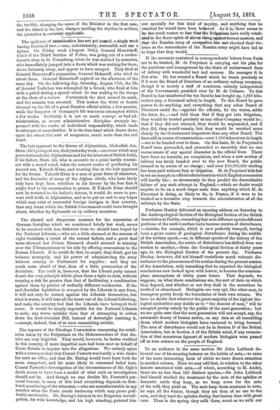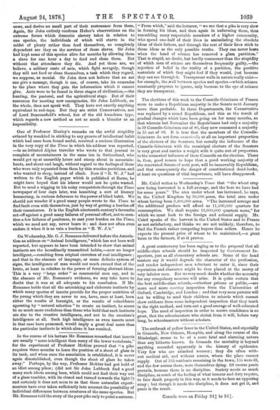To an audience in the same section Sir John Lubbock
de- livered one of his amusing lectures on the habits of ants,—to some of the more interesting facts of which we have drawn attention in another column. Here we may add that, in relation to the other insects associated with ants,—of which, according to M. Andre, there are no less than 583 distinct species,—Sir John Lubbock had himself studied the treatment by the ants of the aphides or domestic cattle they keep, as we keep cows for the sake of the milk they yield us. The ants keep these creatures in corn, he says, all the winter, though they are then of no use to the ants, and they tend the aphides during that barren time with great care. Then in the spring they milk them, much as we milk our
cows, and derive no small part of their sustenance from them. Again, Sir John entirely confirms Huber's observations on the extreme forms which domestic slavery takes in relation to one species, the individuals of which will starve in the midst of plenty rather than feed themselves, so completely dependent are they on the services of these slaves. Sir John bad kept some of this species alive for months by allowing them a slave for one hour a day to feed and clean them. But without that attendance they die. And yet these are, we believe, a military caste of ants, which fight savagely, though they will not feed or clean themselves, a task which they regard, we suppose, as menial. Sir John does not believe that an ant can give a message, though it can, of course, take its comrades to the place where they gain the information which it cannot give. Ants were to be found in three stages of civilisation,—the hunting, the pastoral, and the agricultural stage. But of their resources for meeting new emergencies, Sir John Lubbock, on the whole, does not speak well. They have not exactly anything equivalent to red-tape. But they are strict Conservatives, not of Lord Beaconsfield's school, but of the old humdrum type, which regards a new method as not so much a blunder as an impossibility.































 Previous page
Previous page